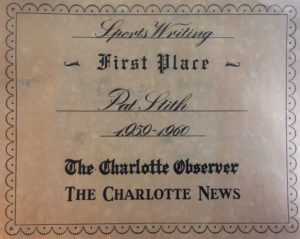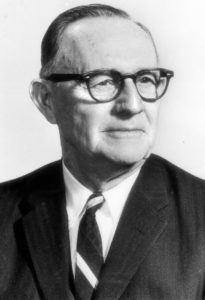It’s a little scary how, in the blink of an eye, the direction of your life can shift radically, this way or that.
 When I was 17-year-old senior I won a sports writing contest for high school students, a contest sponsored by The Charlotte Observer and The Charlotte News. The contest winners in the various categories were invited to a banquet and I sat with some sports writers who worked for The Observer.
When I was 17-year-old senior I won a sports writing contest for high school students, a contest sponsored by The Charlotte Observer and The Charlotte News. The contest winners in the various categories were invited to a banquet and I sat with some sports writers who worked for The Observer.
Partly to make conversation and partly, I guess, to ingratiate myself, I asked them why The Observer’s sports section was so much better than the sport section in the afternoon paper, The

News.
They laughed, pointed to an old man at the head table, and said, “Why don’t you go ask him that question.”
Newspaper people –I know them well, and like them — they can be such rats.
That old man turned out to be Brodie S. Griffith, the editor of the afternoon paper. [He was only 61 years old then, a young fella I’d say now, but he seemed so old when I was 17.] I had no idea who Mr. Griffith was, but I accepted what I took to be a challenge, approached him, and introduced myself.
Before I could ask my question, thank goodness, he offered me a summer job for $1 a hour, working in his paper’s sports department.
I didn’t know anything about newspapering, of course. I couldn’t even type. But that was double the money my Dad paid me for working in his sweat shop so I accepted on the spot.
That’s how I went to work for a newspaper. Except for the time I spent in the Navy and in school at the University of North Carolina at Chapel Hill, that’s all I did for the next 48 years.
Postscript: A dollar an hour in 1960 won’t as bad as it sounds. That’s the equivalent to $8.35 in 2017, well above today’s federal minimum wage of $7.25 an hour.
Coming Friday: Man Overboard! Or Was He?
